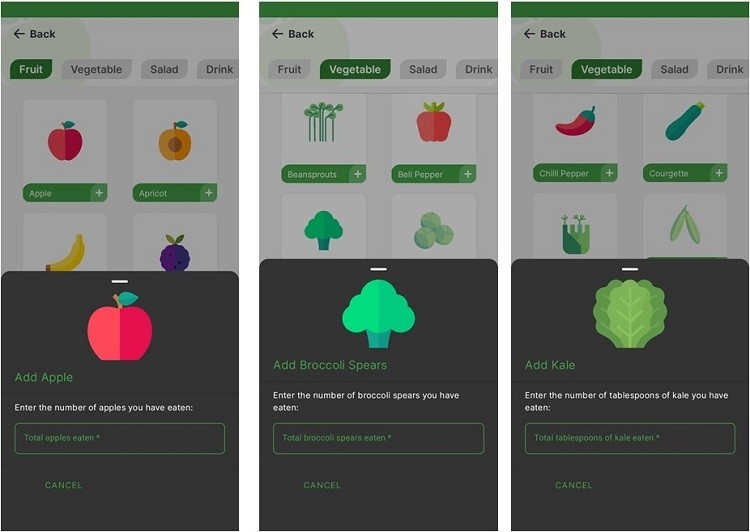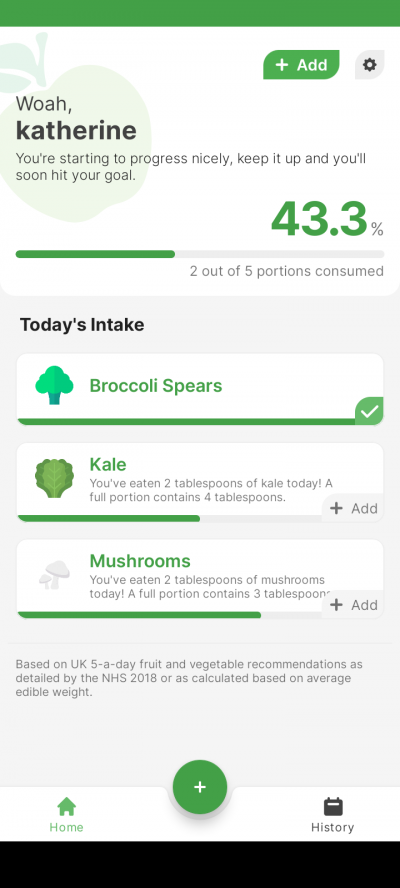‘An effective tool to improve people’s diets for the long term’: App developed to increase fruit and vegetable consumption in adults

According to Public Health England, just a third of adults and 12% of 11–18-year-olds eat the recommended amount of fruit and vegetables. In response, researchers from Bournemouth University have developed a smartphone app coined SMART 5-A-DAY aimed at increasing fruit and vegetable consumption in adults.
Understanding of how to achieve 5 A Day is low
According to research, significant health benefits are associated with the consumption of at least five portions of a variety of fruit and vegetables each day. In the UK, the 5 A Day campaign advocates for just that: the consumption of five 80g portions of fruit and vegetables daily.
The recommendation is based on advice from the World Health Organization, which recommends eating a minimum of 400g of fruit and vegetables a day to reduce the risk of serious health problems, such as heart disease, stroke, and some types of cancer.
But whilst most adults in the UK are aware of the 5 A Day message, research suggests understanding of how to achieve it is low. In a study published in the Journal of Human Nutrition and Dietetics, researchers from Bournemouth University found that knowledge around the message – notably which foods are included, portion sizes, the need for variety, and reasons for consumption – was poor.
Further, the research revealed that fruit and vegetable consumption was related to this knowledge. “These findings suggest that strategies to increase fruit and vegetable consumption will benefit from increasing consumers’ knowledge of the details of the 5 A Day message,” concluded the researchers.
How does the app work?
The aim of the new app is to help people reach the recommended target of eating five 80g portions of fruits and vegetables daily. It tells users whether they are eating the right portion sizes and the right foods to meet the recommended guidelines from health authorities in the UK.

“Almost everyone knows they should eat five a day. But when we looked a little further, it was clear that a lot of people did not know what counts towards the target, they did not know what a portion size is, and many did not realise that they needed to eat five different things,” explained Katherine Appleton, Professor of Psychology at Bournemouth University, who led the studies and the development of the new app.
Professor Appleton also co-authored the study investigating consumer understanding of the 5 A Day message. “Our studies also showed that lower knowledge was associate with lower consumption of fruits and vegetables,” she added.
The app asks users to select the fruit or vegetable they have just eaten as well as how much of if they ate. The app will then tell the user whether that amount made up a full or partial portion, and informs them of how much more would be needed to make a full portion.
At the same time, the app keeps a running total of the user’s progress towards the five a day target.
“What is unique about this app is that as well as tracking daily fruit and vegetable intake, it teaches people about portion

size, so they get to the point where they know what they need to eat themselves,” said Professor Appleton.
“We think this will be an effective tool to improve people’s diets for the long term, rather than simply for the short period that they use the app.”
Testing its efficacy
The SMART 5-A-DAY app launched in the Google Play Store for Android phones just last week, so it is too early to review its impact. However, the effectiveness of an earlier prototype version of the app was examined in a peer-reviewed study.
The pilot test revealed improved behaviour after two weeks compared with baseline in volunteers using the app. Patterns of app usage and qualitative feedback suggested a number of modifications, which have been subsequently made ahead of the Google Play Store launch.
Overall, the researchers concluded that although benefits from the app were small, impacts were expected to likely increase as a result of making such modifications.
Sources:
Journal of Human Nutrition and Dietetics
‘Low fruit and vegetable consumption is associated with low knowledge of the details of the 5-a-day fruit and vegetable message in the UK: findings from two cross-sectional questionnaire studies’
Published 2 June 2017
DOI: https://doi.org/10.1111/jhn.12487
Authors: K. M. Appleton, K. Krumplevska, E. Smith, C. Rooney, M. C. McKinley, J. V. Woodside
JMIR mHealth and uHealth
‘An interactive Mobile Phone App (SMART 5-A-DAY) for Increasing Knowledge of and Adherence to Fruit and Vegetable Recommendations: Development and Pilot Randomized Controlled Trial’
Published 20 November 2019
DOI: doi:10.2196/14380
Authors: Katherine Marie Appleton, David Passmore, Isobel Burn, Hanna Pidgeon, Philippa Nation, Charlotte Boobyer, Nan Jiang













